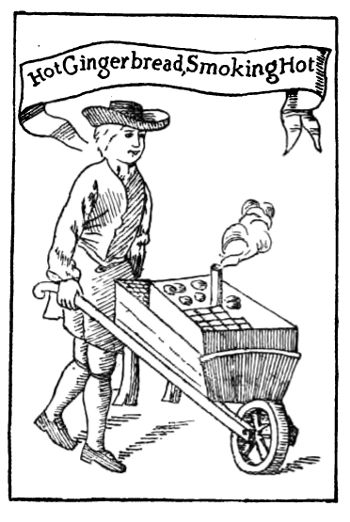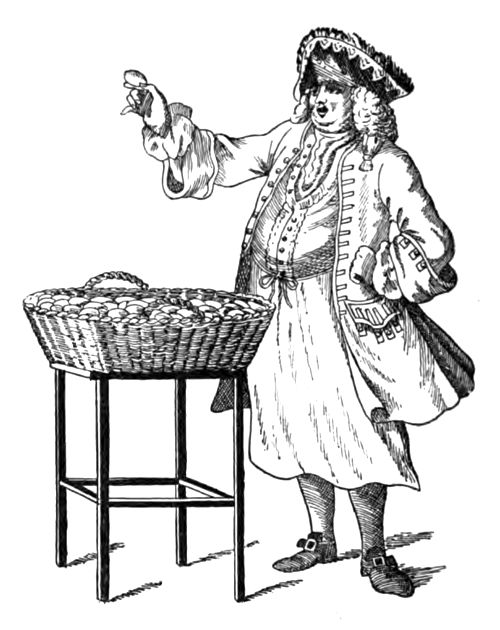‘To Master John, the English maid
A horn-book gives, of gingerbread;
And, that the child may learn the better,
As he can name, he eats the letter.’
It was made with honey, before the introduction of sugar, and must be of remote antiquity and intimately allied to our friend the Bous. The Rhodians made bread with honey which was so pleasant that it was eaten as cake after dinner. The German gingerbread and the French pain d’épice used both to be made with honey. The use of gingerbread is widely spread, and wherever it is eaten it is popular, even in the far East Indies, where both natives and Anglo-Indians rejoice in it. In Holland it is in more request than in any other country in Europe, and the recipe152 for its manufacture is guarded as a jealous secret and descends as an heirloom from father to son.

In its early days gingerbread was an unleavened cake, and the first attempt to make it light was to introduce pearl-ash or potash; afterwards alum was introduced, now it is made of ordinary fermented dough, or with carbonate of ammonia. When well made, gingerbread will last good for years; but if not well made, and of good materials, it will last no time,153 but will get soft with the first damp weather. Such was the stuff sold at fairs—both thick gingerbread and nuts—booths being erected for the sale of nothing else. The background of these booths was ornamented by gingerbread crowns, kings and queens, cocks, etc., dazzlingly resplendent with pseudo gold leaf, or, as it was then called, ‘Dutch metal.’ I do not think that anybody ever ate any of these works of art, I think they were solely for ornament; and, when combined with bows and streamers of bright-coloured ribbons, they made the gingerbread booths the most attractive in the fair.
In the last century it was a great institution, and Swift, writing to Stella, says: ‘’Tis a loss you are not here, to partake of three weeks’ frost, and eat gingerbread in a booth by a fire on the Thames.’ There was a famous itinerant vendor of this article named Ford, but who was more generally known as ‘Tiddy Diddy Doll,’ from a song he used to sing whose words were but those. He flourished in the middle of last century, and Hogarth painted him in one of the scenes of ‘Industry and Idleness,’ where the idle apprentice is going to his doom.

Hogarth’s Picture of Ford.
Hone, in his Every Day Book, vol. i., p. 375, etc., gives a very good account of Ford. He says: ‘This celebrated vendor of gingerbread, from his eccentricity of character, and extensive dealings in his way, was always hailed as the king of itinerant tradesmen.17 In his person he was tall, well made, and his features handsome. He affected to dress like a person of rank—white and gold suit of clothes, 154
155laced ruffled shirt, laced hat and feathers, white silk stockings, with the addition of a fine white apron. Among his harangues to gain customers, take this as a specimen: ‘Mary, Mary, where are you now, Mary? I live, when I am at home, at the second house in Little Ball Street, two steps underground, with a wiscum, riscum, and a why-not. Walk in, ladies and gentlemen, my shop is on the second floor backwards, with a brass knocker at the door. Here’s your nice gingerbread, your spice gingerbread; it will melt in your mouth like a red-hot brick-bat, and rumble in your inside like Punch and his wheel-barrow.’... For many years (and perhaps at present) allusion was made to his name, as thus: ‘You are so fine, you look like Tiddy Doll. You are as tawdry as Tiddy Doll. You are quite Tiddy Doll,’ etc.
But there is a use for badly-made gingerbread which perhaps some of us do not know—a gingerbread barometer. It is nothing more than the figure of a General made of gingerbread, which Clavette buys every year at the Place du Trone. When he gets home he hangs his purchase on a nail. You know the effect of the atmosphere on gingerbread; the slightest moisture renders it soft; in dry weather, on the contrary, it grows hard and tough. Every morning, on going out, Clavette asks his servant, ‘What does the General say?’ The man forthwith applies his thumb to the figure, and replies, ‘The General feels flabby about the chest; you’d better take your umbrella!’ On the other hand, when the symptoms are hard and156 unyielding, our worthy colleague sallies forth in his new hat.
A curious use of dough, somewhat sweetened, was made at Christmas, when it was manufactured into Yule doughs, or dows, or Yule babies, small images like dolls with currants for eyes, intended probably to represent the infant Jesus, which were presented by bakers to the children of their customers. Another Christmas custom connected with dough used to obtain in Wiltshire, where a hollow loaf, containing an apple, and ornamented on the top with the head of a cock or a dragon, with currant eyes, and made of paste, was baked, and put by a child’s bedside on Christmas morning to be eaten before breakfast. This was called a Cop-a-loaf, or Cop-loaf.
Much land in England was held by tenure, in which bread plays a part, as the following instances out of many will show.18
Apelderham, Sussex.—John Aylemer holds by court roll one messuage and one yard [thirty acres] land.... And he ought to find at three reap days, in autumn, every day, two men, and was to have for each of the said men, on every of such reap days, viz., on each of the two first days, one loaf of wheat and barley mixed, weighing eighteen pounds of wax, every loaf to be of the price of a penny farthing; and at the third reap day each man was to have a loaf of the same weight, all of wheat, of the price of a penny halfpenny.
Chakedon, Oxon.—Every mower on this manor 157was to have a loaf of the price of a halfpenny, besides other things.
Glastonbury, Somerset.—In the thirty-third year o............

